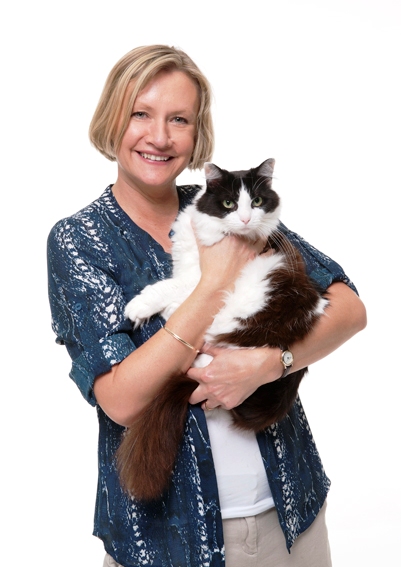It's early days for the Positive Ageing with Animals Project but already we are hearing of many successful pet-friendly models in aged-care facilities.
We'd like to share a sample of the responses so far.....
From Kilsyth, Victoria - recently we had a case where a client would not enter respite care unless he could bring his dog. This sounded daunting for a short period but we proceeded to admit the man and his dog. It worked brilliantly. The man had a great time and the obese dog lost weight with more walks and a controlled diet. The dog continued to sleep on his owner's bed as he would at home. Man and dog were not separated. This proved to be an incentive for the man to make the huge decision to leave home to receive care.
From Lithgow, NSW - you always need to have the 'treat police' on hand to try and stop too many treats being given by everyone. We have a jar of low fat treats! We originally had a Golden Retriever from Guide Dogs NSW /ACT who we retired 18 mths ago. I then approached the local council ranger to keep an eye out at the council animal shelter for a potentially suitable dog for us. Bob (Poodle x Maltese) came into our lives as a scruffy, skinny, matted little fellow with a passion for escaping, but his journey has been a delight and very rewarding for our residents, families and staff, even if our fences look like Fort Knox. Bob goes on bus trips with the residents weekly which makes going out a little more normal for everyone.
From Jindalee, QLD - we find that having pets in the facility creates a more normal, family friendly atmosphere. It provides the opportunity for on going activities and interest for residents, relatives and employees. Several residents have taken on the responsibility of feeding the chickens and collecting the eggs which are then used either for eating by the residents or in cooking activities. The guinea pigs have leads and pouches for petting purposes as well as "grooming" days. The budgies provide the residents with company, interest etc. The joy in residents faces when petting the visiting dogs is amazing even for those who are significantly cognitively impaired.
From Mt Gambier, SA - we have had companion pets living in our residential facilities for nearly 20 years, we have seen them support people through the palliative process and cannot emphasise enough how important they are.
From Lismore area, NSW - our village pets have designated living/sleeping areas, pet care plans, pet doors in various locations, volunteers who walk them daily, respite care with staff so that they get some down time away from busy village life. Our interview process for staff involves confirming that they are prepared to care for the animals and that they accept them as part of everyday life at the villages.
From Hobart, TAS - an elderly resident had to leave his dog behind when he went into aged care. The dog went to his family. He missed his dog terribly so now every day, the family drop the dog off at the facility around 10am where the dog stays until about 4pm. For the family, it's a form of doggy day-care and for the resident and dog its blissful time together (the dog also interacts with other residents too). Isn't this a marvellous win/win situation!
Aged care accommodation providers are invited to fill out the on-line survey by clicking here.
We're thrilled to welcome Dr Jo Righetti on board as an AWLA Ambassador. 
A renowned animal behaviourist, her expertise, energy and commitment to the well-being of companion animals are a perfect fit and we are excited that Dr Jo will be representing us across the country.
Dr Jo will be advocating for the adoption of animals from our affiliated shelters around the country and promoting our campaigns aimed at strengthening the human-animal bond and positive welfare outcomes for companion animals. As a starting point, Dr Jo will be alerting people to animals who are available for adoption in each state via social media channels each week.
Dr Jo says, "AWLA is taking a united and co-operative approach to improving the lives of unwanted companion animals and their humans. This makes me proud to be an Ambassador for such a great organisation."
You can find Dr Jo on Facebook "Pet Problems Solved with Dr Jo" or visit her website www.petproblemsolved.com.au.
On July 31st, the government announced an Independent Inspector-General of Animal Welfare and Live Animal Exports.
This new Inspector General is to oversee the role of Department of Agriculture, Fisheries and Forestry (DAFF) as the regulator of live animal exports and ensure that the regulator is working within the regulatory framework.
We welcome this step and look forward to a truly independent, impartial and credible voice working to ensure the humane treatment of animals.
Questions remain as to how this appointment relates to the proposed independent office of animal welfare, a commitment made by the government in 2011. What stage of planning and development has the Office of Animal Welfare reached? Have the resources involved in the planning effort been expended without outcome or are outcomes still to follow?
The appointment of one inspector to oversee animal welfare and live export means they will have an enormous workload on their hands, not least due to the number of cases already under investigation in DAFF.
We would welcome an appointment which genuinely reflects understanding of (and respect for) both industry and animal welfare submissions and provides fair and equal access to representation from both sides of the debate. Combined with meaningful public consultation and a transparent approach to decision making, the Independent Inspector of Animal Welfare and Live Export could make a positive difference for animals.
The opportunity is there.
Its mind boggling to think two un-desexed dogs and their offspring can number 67,000 in just six years. Two un-desexed cats and their offspring (if none are desexed) can number 420,000 in seven years.
It’s a fact that desexed pets generally become better companions and live longer, healthier lives.
With desexed animals there is a reduced risk of getting cancer or other diseases of the reproductive organs. Dogs and cats who have had the snip are less likely to suffer from anti-social behaviours which means their human companions have an easier time of it too.
In July, pet owners have even more incentives to desex their pets.
National Desexing Month is held in July each year and offers all pet owners discounts on the cost of this surgery for dogs and cats. The National Desexing Network (NDN) runs this and other year-round discounting programs.
While discounts are available to everyone during July, those who are in genuine financial need can access discounts all year round. Those wishing to find out if they qualify beyond July can phone 1300 368 992 or visit www.ndn.org.au
The service aims to make this surgery more affordable to those who might not otherwise be in a position to de-sex their pets but it’s not only the owners who benefit. So do all the cats and dogs who would otherwise be brought into a world where there are simply not enough caring homes for them.
NDN has a nationwide network of participating veterinary clinics who offer the discounts. If you know of houses, streets or areas within your community where there are regular litters born to undesexed cats and dogs, you are encouraged to print and distribute an assistance flyer which can be downloaded from www.ndn.org.au
Some ideas are so good you have to wonder why someone didn’t come up with them sooner. One of these ideas is crowd architecture - collaboration around housing based on the needs of specific groups of people.
People with like-minded needs and interests (like pet owners) get together and design housing that suits them. When enough pet-people get together, housing projects can be discussed and planned to reflect the needs of pets.
Apartments can be designed with extra courtyards and other pet friendly features. Urban pet owners, a group who often have problems gaining permission to have pets in apartments, have a lot to gain from this new concept.
Melbourne architect Ivan Rijavec recently launched an online platform to ensure urban owners have the say on what their apartment will look like and what features it will have. Groups form around "niches" such as pets or gardens - when enough members seek similar aspects like rooftops, courtyards, pet-friendly areas, then potential housing projects will be proposed.
The idea is the buying power of the group makes it more affordable. In addition to cutting costs, Rijavec believes handing more power to buyers is a natural evolution. We're all for protecting the bond between people and their animal companions by planning for pets in urban settings. Visit citiniche.com.au for more.
Animal Welfare League Australia (AWLA) is proud to be Conference Partner for the 5th National G2Z Summit 2013.
Sharing resources, solutions and successful models is what it’s all about when it comes to saving the lives of more animals, providing high welfare standards and strengthening the people-animal bond. The G2Z model inspires us to strive even harder on behalf of our four-legged ‘clients’ with the momentum around G2Z exciting and challenging us in equal measure.
We proudly acknowledge AWLQ, an AWLA member, for developing this community change model to prevent abandonment and save existing lives. Australia’s widespread affection for dogs and cats, means saving lives is a goal most of us share and with the help of the community, government and non-government organisations, fewer adoptable animals are being euthanased.
The 2013 G2Z Summit will take us to the next level in achieving this goal, with inspirational speakers like Sharon Harmon, an animal welfare professional of 30 years experience, explaining how she achieves a 98% combined save rate.
Together we can save lives ...for more details on the 5th National G2Z Summit visit http://www.g2z.org.au/summit2013.html
We Aussies love our pets. We have one of the highest incidences of pet ownership in the world but surprisingly there is a lack of reliable data on pet ownership. To address the information gap, AWLA is supporting a proposal that the next national census in 2016 be used to obtain data on pet ownership.
A national committee, (Companion Animal Working Group) has proposed two questions to accurately identify how many households have cats and dogs and whether those cats and dogs are de-sexed. This kind of information would assist us to plan for the welfare of companion animals across Australia.
For pet owners, census data could potentially see the creation of more dog-friendly parks and beaches or services such as after hours vets. Urban planners, councils developing local by-laws to manage cats and dogs and those delivering community education programs on socially responsible pet ownership could all benefit from having access to data on cats and dogs.
With pets proven to provide significant social, physical and mental health benefits to individuals and communities, there is likely to be a continuing and growing need for reliable statistics on pet ownership. We await the Government’s decision on including pet ownership in the next census with interest.
Imagine a time when the majority of people, including politicians and legislators accept high standards of care and protection for animals as the norm.
Imagine strong and practical animal welfare legislation in place nationally and supported by animal lawyers who defend mistreated animals, confirming high standards of animal welfare to the public.
Imagine an official public database providing access to procedures for delivering good animal welfare outcomes.
This vision is championed by Antione Goetschel, the world’s first lawyer for animals who will be speaking at venues around Australia in April and May. A specialist in human-animal relationships in Swiss and international law, Antoine has represented animal interests in cruelty cases and played a major role in Swiss animal law referendums.
He fought successfully to have the dignity of living beings protected by the Swiss Constitution.
Swiss laws set out, species by species, measures to protect the dignity and well-being of animals.
Antione Goetschel is speaking in Australia as part of an annual animal law lecture series hosted by Voiceless. Venues and dates are available at www.voiceless.org.au
We have a new and valuable ally in protecting our pets' long-term health. Disease WatchDog is a national surveillance system for tracking and mapping communicable diseases in companion animals. In a world first, this system is used by local vets to record cases of disease in dogs and cats at suburb level.
Pet owners can access this information and take action to protect their animal’s health. Disease WatchDog founder, Dr Mark Kelman, Technical Services Manager for Virbac Animal Health says the system increases community awareness around preventable animal diseases. By informing the public on outbreaks in their local area, the spread of diseases such as the highly infectious Parvovirus can be reduced. The key is vaccination - one simple vaccination can save your animal’s life.
With fifty percent of Australia’s registered vet clinics currently participating in the program, Disease WatchDog has logged 11,814 cases of disease in Australia since its inception two years ago, including 3,968 cases of canine parvovirus. Other recorded diseases include canine cough, canine distemper, canine hepatitis, feline calcivirus and more.
A new website launched this year enables the public to monitor disease outbreaks. By logging on with your email address at www.diseasewatchdog.org you can view maps of disease hotspots and access information on diseases.
We may live in an increasingly artificial world but we belong to the natural world. All life is inter-connected.
Anyone who owns a pet knows how animals can enrich people’s lives.
Although Valentine's Day is designed as a day to pamper that special person in your life, it’s also a good day to celebrate the unconditional love that companion animals can offer. People enjoy attachments that are oblivious to their faults and this is provided in the uncritical affection of pets.Then there are the health benefits which companion animals bring their human families. These benefits are well known by now - lower blood pressure, lower heart rate, less visits to the doctor and reduced anxiety levels to name a few.
In exchange for these benefits, our role is to keep companion animals safe, happy and healthy. Valentines Day is a good time to contemplate ‘having a heart’ and extending care to include vulnerable animals. If lifestyle and circumstances permit, adopt a homeless animal. If not, there are many other simple ways to support animals.
Choose humanely produced foods, stop and sign petitions designed to improve conditions for animals, send a letter or email to the relevant government minister on issues where animals are receiving unnecessarily harsh, cruel or inhumane treatment such as live export and intensive breeding practices.
By engaging with politicians on animal welfare issues, you are advocating on behalf of animals. Get involved - animals don't have a voice and they need you.


